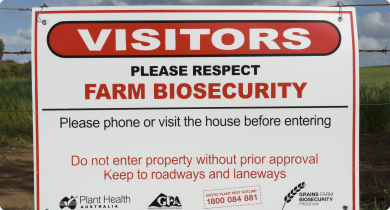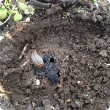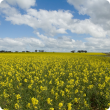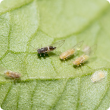Pests, weeds & diseases
Pests, weeds and diseases pose a serious risk for primary producers as they can impact on market access and agricultural production.
To reduce the impact of pests, weeds and diseases, the Department of Primary Industries and Regional Development:
- works with landholders, grower groups, community groups and biosecurity groups.
- provides diagnostic services and information on prevention, management and treatment.
- provides biosecurity and quarantine measures to prevent introduction, and to eradicate or manage current pests.
For advice on pests, weeds and diseases search our website, the Western Australian Organism List or contact our Pest and Disease Information Service (PaDIS).
For diagnostic services, please contact our Diagnostic Laboratory Services.
Filter by search
Filter by topic
- Diseases (12) Apply Diseases filter
- (-) Remove Crop diseases filter Crop diseases
- (-) Remove Pests filter Pests
- Crops (10) Apply Crops filter
- Grains (9) Apply Grains filter
- Pest insects (8) Apply Pest insects filter
- Canola (5) Apply Canola filter
- Wheat (4) Apply Wheat filter
- Oats (4) Apply Oats filter
- Grains research & development (4) Apply Grains research & development filter
- Control methods (4) Apply Control methods filter
- Nematodes (3) Apply Nematodes filter
- Weeds (3) Apply Weeds filter
- Mechanical, physical and cultural (3) Apply Mechanical, physical and cultural filter
- Lupins (3) Apply Lupins filter
- Barley (3) Apply Barley filter
- Crop weeds (3) Apply Crop weeds filter
- Viruses & virus-like (2) Apply Viruses & virus-like filter
- Pulses (2) Apply Pulses filter
- Fungi (2) Apply Fungi filter
- Production & postharvest (2) Apply Production & postharvest filter
- Horticulture (1) Apply Horticulture filter
- Harvesting (1) Apply Harvesting filter
- New horticulture crops (1) Apply New horticulture crops filter
- Plant biosecurity (1) Apply Plant biosecurity filter
- Quarantine (1) Apply Quarantine filter
- Plant nutrition (1) Apply Plant nutrition filter
- Grains Research & Development (1) Apply Grains Research & Development filter
- Fungicides (1) Apply Fungicides filter
- Biosecurity (1) Apply Biosecurity filter
- Bacteria (1) Apply Bacteria filter
- Biosecurity & quarantine (1) Apply Biosecurity & quarantine filter
- Chemicals (1) Apply Chemicals filter
- Exporting from Western Australia (1) Apply Exporting from Western Australia filter
- Exporting plant and plant products (1) Apply Exporting plant and plant products filter







